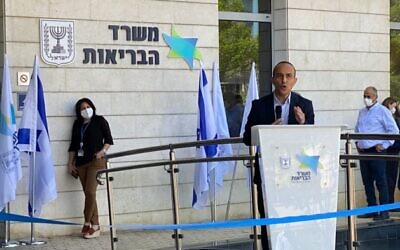The Health Ministry said Friday that 2,068 people tested positive for the coronavirus on Thursday, with 10,777 new cases found in total over the course of the week.
The daily infection rate was the highest seen in Israel since the end of July.
The ministry reported eight more coronavirus deaths since Thursday evening, taking the total to 891.
Of the 20,444 active cases in Israel, 426 patients were in serious condition with 118 of them on ventilators, and 178 people were in moderate condition. The remainder had mild or no symptoms.
There have now been 111,493 cases of the coronavirus in Israel since the start of the pandemic.
The new figures came as testing levels appeared to remain at high levels, passing the 30,000 mark for the third day in a row on Thursday, with 36,372 carried out returning a positive rate of 5.9%.
Ministers are expected on Sunday to discuss coronavirus tzar Ronni Gamzu’s “traffic light” plan, which last week they refused for a third time to approve, reportedly due to opposition from ultra-Orthodox ministers who oppose restrictions that could shutter synagogues in high-infection areas.

Coronavirus czar Ronni Gamzu at an inauguration ceremony of a Health Ministry command center near Ben Gurion Airport, August 26, 2020. (GPO)
Gamzu’s plan outlines restrictions to be imposed during the High Holiday period, which begins next month.
The plan would only place restrictions on cities with high morbidity rates, where the rate of infection is not slowed by September 10. The restrictions would take effect starting from Rosh Hashanah until October 11, after the Sukkot holiday.
Housing Minister Yaakov Litzman said in an interview published Friday that his United Torah Judaism party would consider leaving the coalition if a nationwide lockdown is imposed over the holiday period.
“The approval for mass demonstrations [outside the Prime Minister’s Residence] alongside the opening of cultural centers, but with continued restrictions on synagogues and the prevention of travel to Uman, have destroyed public confidence in the system,” Litzman told the Hamodia daily.
On Wednesday, Ukraine announced it would seal its borders to foreigners through September to curb rising coronavirus infections, blocking Israeli and Jewish pilgrims from traveling to the city of Uman.
The city usually sees tens of thousands of Hasidic Jews visit the gravesite of Rabbi Nachman of Bratslav for the Rosh Hashanah holiday, which this year begins the evening of September 18.
The announcement of the entry ban came after Gamzu asked Ukrainian President Volodymyr Zelensky to prevent the pilgrimage, fearing returning pilgrims could drive up infection rates in the Jewish state.
Related posts:
Views: 0
 RSS Feed
RSS Feed
















 August 28th, 2020
August 28th, 2020  Awake Goy
Awake Goy  Posted in
Posted in  Tags:
Tags: 
















